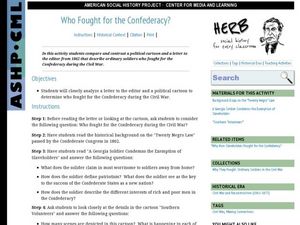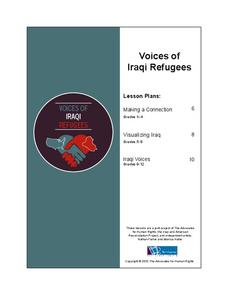Curated OER
Who Fought for the Confederacy?
Did the Confederate Army really consist of southern volunteers? Using primary sources, historians examine the story behind the "Twenty Negro Law" and realities of conscription during the Civil War. A letter and a lithograph (included as...
Center for History and New Media
A Look at Virginians During Reconstruction, 1865-1877
The transition between rebellion to reunification was not smooth after the Civil War. Young historians compare primary and secondary source documents in a study of the Reconstruction era in Virginia, noting the rights that were not...
Simon & Schuster
A Teacher's Guide to 1776 by David McCullough
David McCullough's Pulitzer Prize-winning novel, 1776, is the focus of a 28-page teacher's guide. The guide includes pre-reading questions, background information about key British and American figures, and chapter-by-chapter lessons.
Academy of American Poets
Teach This Poem: "Black Laws" by Roger Reeves
After investigating the Black Lives Matter movement, class members do a close read of Roger Reeves' "Black Laws." They write down words and phrases that rhyme, consider the kinds of rhymes used and their function in the poem. Scholars...
National Woman's History Museum
The Triangle Shirtwaist Fire
On March 25, 1911, 146 garment workers died in the Triangle Shirtwaist Factory fire. Class members use primary source documents to research the tragedy and how it lead to the creation of labor unions and new labor laws. As an exit...
Simon & Schuster
Curriculum Guide to: A Tale of Two Cities by Charles Dickens
A Tale of Two Cities is the core text for five lessons in a Curriculum Guide for Charles Dickens' famous novel. To begin, scholars examine Dickens' use of anaphora in the first line of the novel. Next, they compare the point of view in a...
Alabama Department of Archives and History
Alabama's 1901 Constitution: What Was at Stake?
Who should be able to vote? As part of a study of the 1901 Alabama Constitution, class members examine primary source document that reveal the reasons the authors gave to support their positions on this question and their assumptions in...
Library of Congress
Industrial Revolution
Could you live without your phone? What about cars, steel, or clothing? Class groups collaborate to produce presentations that argue that either the telephone, the gramophone, the automobile, the textile industry, or the steel...
Center for History and New Media
Growing Up in a Segregated Society, 1880s–1930s
What did segregation look like in the beginning of the 20th century? Middle and high schoolers view images of segregated areas, read passages by Booker T. Washington and W.E.B. DuBois, and come to conclusions about how the influence of...
Alabama Department of Archives and History
From Alabama Farmer to Civil War Soldier
As part of a study of the Civil War, class members conduct a WebQuest to create a timeline of battles fought by the 10th Alabama Infantry Regimen. They then use Google Earth to pinpoint these battles of the Civil War on a map of Alabama.
National Woman's History Museum
The Road to Suffrage
Scholars each research a different entry on the included suffrage timeline that lead to the ratification of the 19th Amendment. Using a minimum of three sources, investigators add what they have learned to a combined class Suffrage...
Alabama Department of Archives and History
Yellow Journalism
What role did yellow journalism play in bringing the United States into war with Spain? As part of their study of the Spanish-American War, class groups examine newspapers of the times and other texts and then produce their own...
Advocates for Human Rights
Voices of Iraqi Refugees
The stated goal of this resource is to provide learners with basic facts about and build empathy for Iraqi refugees. To do so elementary classes develop a plan for how to welcome refugees to their classroom. Middle schoolers read...
iCivics
A Very Big Branch
Through detailed secondary source reading material and an interactive "true/false" activity, learners discover the depth and complexity of the executive branch in the United States government. Topics covered include executive...
Alabama Department of Archives and History
A Worse Death: War or Flu?
In a lesson that integrates history and mathematics, class members create graphs that compare military death statistics from World War I with those that resulted from the influenza pandemic of 1918.














